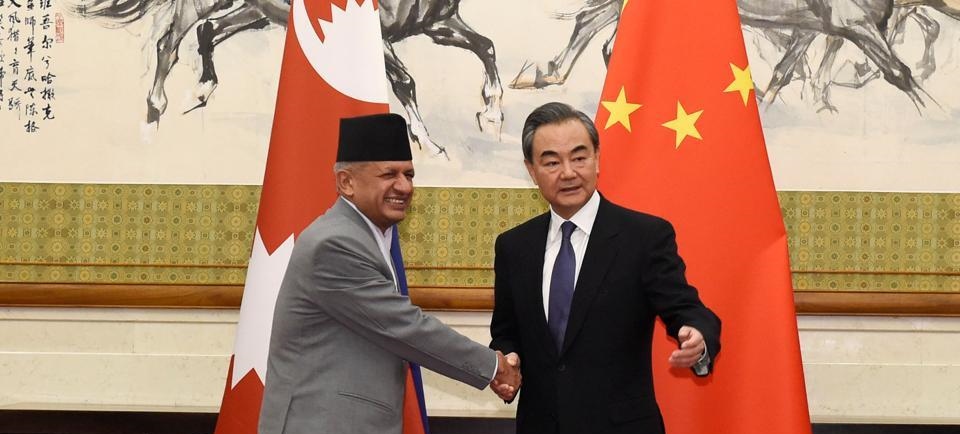Nepal-China improve ties
April 19, 2018 | Expert Insights

China’s Foreign Minister Wang Yi has called on India to increase its support for Nepali projects, adding that a stable region is beneficial for development. Nepal has deepened ties with China to counter Indian influence in recent years. Nepal’s Prime Minister Oli has noted that Nepal doesn’t want to “depend on one country or have one option”. Meanwhile, Beijing has commended Nepal’s recent “commitment towards independent foreign policy.”
Background
Nepal is a land locked country with India on three sides and China on the northern border. Ties between Nepal and China began in the mid-7th century. Initially subdued, trade ties have grown significantly since 1975. Nepal remained neutral during the Sino-Indian border conflict of 1962. Since 2016, China has opened 32 border crossing points into Nepal. China has also made significant investments in improving infrastructure in Nepal. It was announced in January 2018, that China will become Nepal’s second internet service provider. Up until now Nepal depended on India for internet access.
Nepal and China have a number of bilateral mechanisms in areas including economy and trade, agriculture, and border law. Chinese assistance to Nepal, which began in the 1980s, falls into three categories: Grants (aid gratis), interest free loans and concessional loans. Beijing is Nepal’s second largest trading partner. However, India continues to be Nepal’s key economic as well as security partner.
India-Nepal relations
India and Nepal share close linguistic, marital, religious, historic, and cultural ties, and the border between India and Nepal is an open boundary. Diplomatic ties were formalised with the 1950 Indo-Nepal Treaty of Peace and Friendship.
Ties between the two nations have been strained in recent years, with anti-Indian sentiment on the rise among the citizens as well as the government. These tensions came to a head in September 2015. India is believed to have supported minority groups such as the Medhesis, who were protesting the new Nepali constitution. The Nepali government accused India of imposing an undeclared blockade, preventing vital resources including fuel from entering the land-locked country. This caused an economic and a humanitarian crisis in Nepal. India denied that it had intentionally initiated the blockade.
However, Nepal acknowledged its ties to India earlier this month, when Prime Minister K.P Oli visited India. Oli, who won elections earlier this year by a large majority, is known for being pro-China. During the visit, the two heads of state confirmed the construction of a railway line between an Indian border town and Nepal, as well as deals on inland waterways and agriculture. Upon his return from India, Oli told Nepali media that his visit was “significant and fruitful”.
Analysis
China’s Foreign Minister and state councillor Wang Yi met with Nepali foreign minister Pradeep Kumar Gyawali on Wednesday. Gyawali is currently on a state visit to Beijing. Wang has reportedly called for India to increase its involvement and cooperation on Nepali projects. Wang claimed that Nepal, China, and India, were “natural friends and partners.” “We are neighbours connected by the same mountains and rivers. As we say in China, family members and neighbours wish each other well,” he said.
During the meeting, Nepal also reiterated its support for the one-China policy. Gyawali also noted that Nepal “sees greater prospects for global economic development and stability with increased involvement of China in managing global affairs.”
Wang stressed that Nepal could benefit from support from both India and China. “Nepal on its part wants to leverage its geographical advantage and connect China and India for greater development. And Nepal stands as a natural beneficiary from sound cooperation from China and India,” he said on Wednesday. He emphasised the importance of stability for development.
Wang also called for the creation of an economic corridor between India, Nepal, and China. Nepal joined China’s Belt and Road initiative in May 2017, however, India is one of the few countries in the region that has resisted participating in Beijing’s trans-continental trade route. Gyawali has confirmed that the two nations have begun research on the possibility of creating a railway link between Tibet and Kathmandu. “We share common views on a cross-Himalayas, multi-dimensional transport network in the long term,” he said.
In addition to the rail link, Nepal has signed a number of agreements on trade and transit with Beijing. Prime Minister Oli has noted his intention to revive the China-sponsored Budhi Gandaki dam which was a sore point for the government in New Delhi. China has also played a role in a number of other projects, including an international airport in Pokhara, and two SEZs. China accounted for almost 60% of Nepal’s foreign direct investment in the latter half of 2017. Meanwhile, Nepal has repeatedly queried about delays in agreements with India. Some Indian projects in the region have never reached completion.
Assessment
Our assessment is that Nepal may continue to strengthen ties with Beijing in order to temper Indian influence. We have previously noted that Nepal has made it clear that Indian interference in their affairs will not be tolerated. Some have observed that Nepal’s strategy echoes Sri Lanka’s pro-China policies that allowed Beijing to increase its presence in the Indian Ocean. China has also made inroads in the Maldives, and has strong relations with Pakistan, one of India’s greatest rivals. PM Oli’s meeting with Indian PM Modi was described as an attempt to “reset” ties.
However, we believe that India may have to work harder to strengthen positive ties with its smaller neighbours if it wishes to maintain its position as a regional power.








Comments